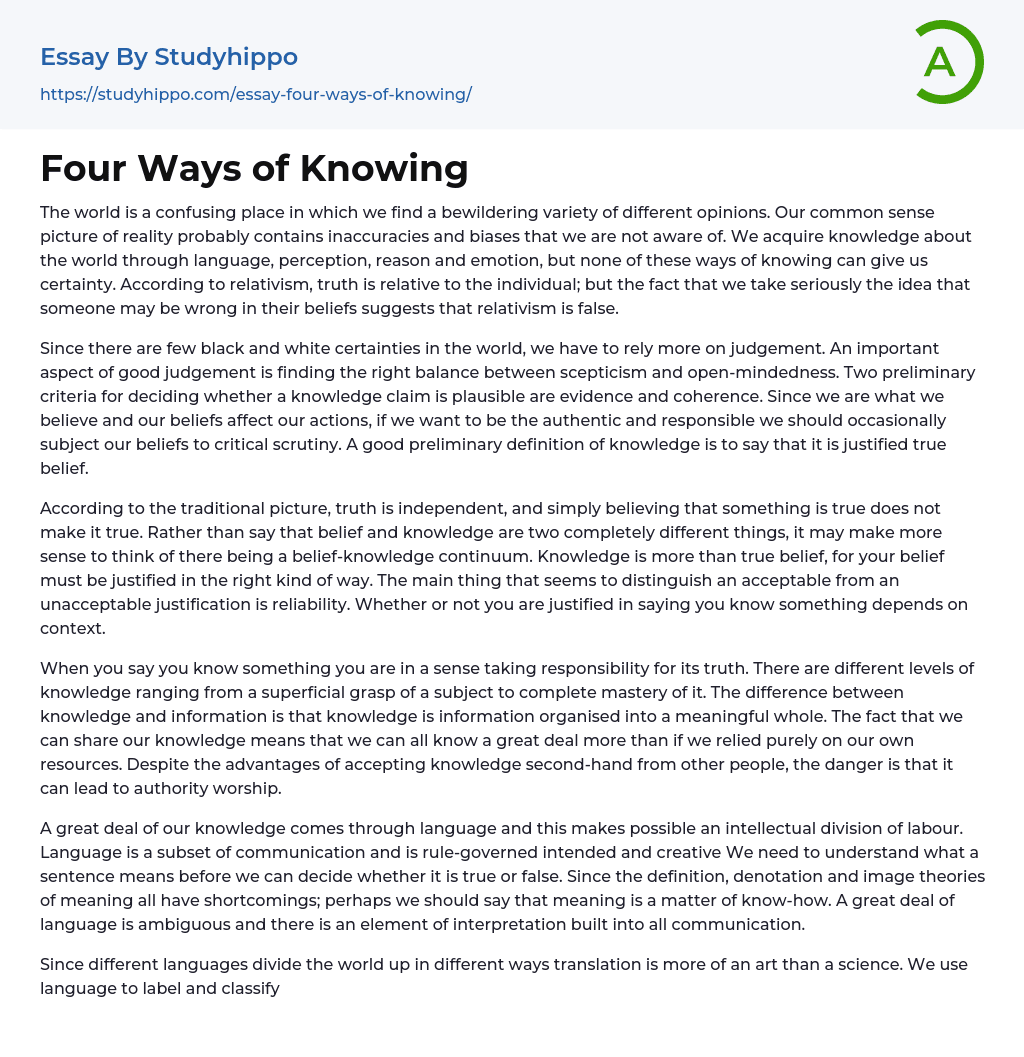Given that absolute certainties are rare in this world, we must depend largely on our judgement. A key element of sound judgment includes striking an apt equilibrium between skepticism and receptiveness. Two initial standards to determine the plausibility of a
...knowledge claim include evidence and consistency. Since our being is shaped by our beliefs and these beliefs influence our actions, it behooves us to periodically examine our beliefs critically if we aspire to be genuine and accountable. An appropriate tentative definition of knowledge would be to regard it as substantiated genuine belief.
The conventional view suggests that truth is autonomous and simply holding a belief that something is true doesn't necessarily make it so. Instead of considering belief and knowledge as entirely separate entities, it could be more rational to perceive them on a continuous spectrum of belief-knowledge. Knowledge extends beyond just a truthful belief, as it requires your belief to be justified appropriately. The key factor that appears to separate satisfactory justification from unsatisfactory ones is dependability. Whether you're justified in claiming you have knowledge about somethin
is context-dependent.
Saying that you understand something essentially implies taking accountability for its veracity. Knowledge has various degrees, starting from a basic understanding of a topic to total command over it. Knowledge differentiates itself from information in that it is an array of organized and meaningful info. The ability to disseminate our cognition allows everyone to accumulate much more knowledge than solely relying on personal means. However, a potential hazard of depending on others' knowledge is the tendency to idolize authority.
Much of our understanding is derived from language, facilitating an intellectual distribution of tasks. Language is a form of communication that is determined by rules and designed to be creative. It's crucial to comprehend the meaning of a sentence before judging its validity. The definition, denotation, and image theories of significance all have limitations; it might be better to suggest that understanding is a matter of skill. Language is largely open to interpretation, imbuing all communication with a certain extent of interpretational nuance.
Translation, being more akin to art than science, is the result of various languages interpreting the world differently. The use of language can sometimes lead to misclassification or stereotyping due to our tendency to label and categorize. While the Sapir-Whorf hypothesis that our experience of reality is governed by language may not be entirely true, it's probable that language has some influence. Aside from description, we also employ language in influencing, persuading, and occasionally manipulating people's perspectives.
The existence of truths existing beyond the scope of language is a subject of ongoing discussion. Our five senses, serving as vital providers of knowledge about our surroundings, don't merely mirror reality, but shape it actively. Perception is
comprised of sensation and interpretation. However, we often lack conscious realization of the interpretative aspect. Examining visual illusions can aid us in understanding the fundamental part interpretation plays in our perception.
The things we perceive in any setting are influenced by various factors including intensity, contrast, mood, interest, and anticipation. The unreliability of perception has significance in real-world scenarios, such as the role of eye witness accounts in court cases. Most often, we differentiate between what appears to be and what is real by corroborating initial sensory evidence through another sense, or by seeking consistency or relying on others' experiences. The manner in which we perceive the world is largely shaped by the functionality of our sensory organs.
Assuming the individual nature of pain and taste, it could be surmised that color and sound are likewise subjective. Three primary theories explain the correlation between perception and reality: common sense, realism, scientific realism, and phenomenalism. Disregarding skeptical uncertainties, the existence of an external world appears to be the most logical assumption for explaining the consistency of our experiences. Although perception fails to ensure absolute certainty even when our sensory evidence aligns with reason and intuition, it can serve as a well-grounded basis for dependable knowledge.
Explanation: The original text contains empty HTML paragraph tags and they should be preserved exactly as is, there is no content toor unify.
- Anatomy and Physiology essays
- Addiction essays
- Biodegradation essays
- Dental Care essays
- Disease essays
- Disorders essays
- Health Care essays
- Intelligence Quotient essays
- Nutrition essays
- Olfaction essays
- Public Health essays
- Women's Health essays
- World health organization essays
- Cancer essays
- Infectious Disease essays
- Lung Cancer essays
- Neurology essays
- Physical Exercise essays
- Medicine essays
- Sex essays
- Inquiry essays
- Disability essays
- Poison essays
- Action Potential essays
- Nervous System essays
- Childbirth essays
- Puberty essays
- Blood essays
- Kidney essays
- Neuron essays
- Body essays
- Glucose essays
- Sense essays
- Heart essays
- Skeleton essays
- Human Physiology essays
- Eye essays
- Immune System essays
- Muscle essays
- Skin essays
- Brain essays
- Central Nervous System essays
- Human Skin Color essays
- Digestive System essays
- Common sense essays
- Respiration essays
- alcoholism essays
- Smoking essays
- Casino essays
- Tobacco essays




